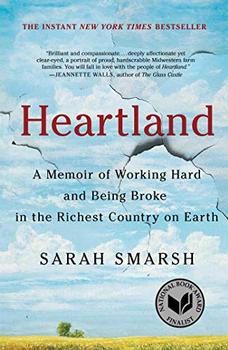Summary | Excerpt | Reading Guide | Reviews | Beyond the Book | Readalikes | Genres & Themes | Author Bio

Critics' Opinion:
Readers' Opinion:
First Published:
Sep 2018, 304 pages
Paperback:
Sep 2019, 304 pages
 Book Reviewed by:
Book Reviewed by:
Rebecca Renner
Buy This Book
Grandma Betty was driving back and forth to work in Wichita every day but helped with baby care when she could, like the day I choked on formula and she shook me by the ankles while Mom napped.
'Your face turned red as a beet," Grandma would say, laughing and half-apologetic, whenever she retold the story. "Shit, I didn't know what to do."
In a few months, when the election rolled around, Mom would align with one-third of Kansas voters and cast her first ballot for Carter's reelection. But Ronald Reagan won, of course, and got to work cutting taxes.
Reagan said that big, private money would "trickle down" to us through the economy, as though we were standing outside with our mouths open praying for money to rain. Reagan was big on states' rights and deregulation, which appealed to the government-wary streak of my people. Back then, conservatism made some fair claims about keeping government out of people's lives, a noble enough idea in a country that won its independence from an oppressive monarchy.
But keeping government out of the private sector could lead to a different sort of oppression, it would turn out. Federal policies that had created a middle class in the twentieth century were giving way to corporate rule in which billionaires with political influence could be kings behind the scenes.
That same year, 1980, a country singer first recorded a song about the Great Depression with the lyrics, "Somebody told us Wall Street fell, but we were so poor that we couldn't tell." It wasn't the 1930s anymore, but even in my childhood before cable television and the internet, we lacked understanding of our place in the economy. We were so unaware of our own station that, in the rare instance that the concept of class arose, we thought we were middle class. That term occasionally got thrown around in the news, and we recognized it to mean "not poor, but not rich." Since we had enough to eat, that's how we thought of ourselves.
Being conceived a few months after Carter's foreboding speech and born a few months before Reagan's inauguration meant that my life and the economic demise of American workers would unfold in tandem. But we couldn't see it yet out in the Kansas fields.
That we could live on a patch of Kansas dirt with a tub of Crisco lard and a $1 rebate coupon in an envelope on the kitchen counter and call ourselves middle class was at once a triumph of contentedness and a sad comment on our country's lack of awareness about its own economic structure. Class didn't exist in a democracy like ours, as far as most Americans were concerned, at least not as a destiny or an excuse. You got what you worked for, we believed. There was some truth to that. But it was not the whole truth.
* * *
Dad had to fold his foundation-laying business a couple years before I was born. You can't pour concrete when the temperature is below freezing, and the record-setting winter of 1978 left Dad without work for his employees. He went back to doing carpentry with his dad, uncles, and two older brothers, known in the area as Smarsh Brothers Construction. He plowed his and other people's fields and took side jobs as a handyman.
When I was still an infant, Mom, Dad, and I left the little red house for a trailer that Betty and Arnie had parked next to their farmhouse. Arnie hooked the trailer behind his tractor and pulled it to our land, a flat stretch of grass and dirt between the tall dam of a state reservoir and the flat wheat fields Dad had worked his whole life.
I had my first birthday party in the trailer. Dad kept working and saving money, and I became a white-haired toddler. Mom cooked supper in the tiny kitchen that had black-and-white wallpaper printed with turn-of-the-century advertisements for corsets and shaving cream.
More often than not, Mom had a job outside our home, too. It almost always involved selling something. She decided to get a state real estate license to sell houses in Wichita. To be closer to work for both her and Dad, I guess—there being more structures to construct and sell in cities, of course—we moved east to Wichita, first to an apartment for less than a year, then to a rented house in a modest but quiet, treed neighborhood. On weekends, Dad worked on our house in the country.
Excerpted from Heartland by Sarah Smarsh. Copyright © 2018 by Sarah Smarsh. Excerpted by permission of Scribner. All rights reserved. No part of this excerpt may be reproduced or reprinted without permission in writing from the publisher.





The House on Biscayne Bay
by Chanel Cleeton
As death stalks a gothic mansion in Miami, the lives of two women intertwine as the past and present collide.

The Flower Sisters
by Michelle Collins Anderson
From the new Fannie Flagg of the Ozarks, a richly-woven story of family, forgiveness, and reinvention.

The Funeral Cryer by Wenyan Lu
Debut novelist Wenyan Lu brings us this witty yet profound story about one woman's midlife reawakening in contemporary rural China.
Your guide toexceptional books
BookBrowse seeks out and recommends the best in contemporary fiction and nonfiction—books that not only engage and entertain but also deepen our understanding of ourselves and the world around us.